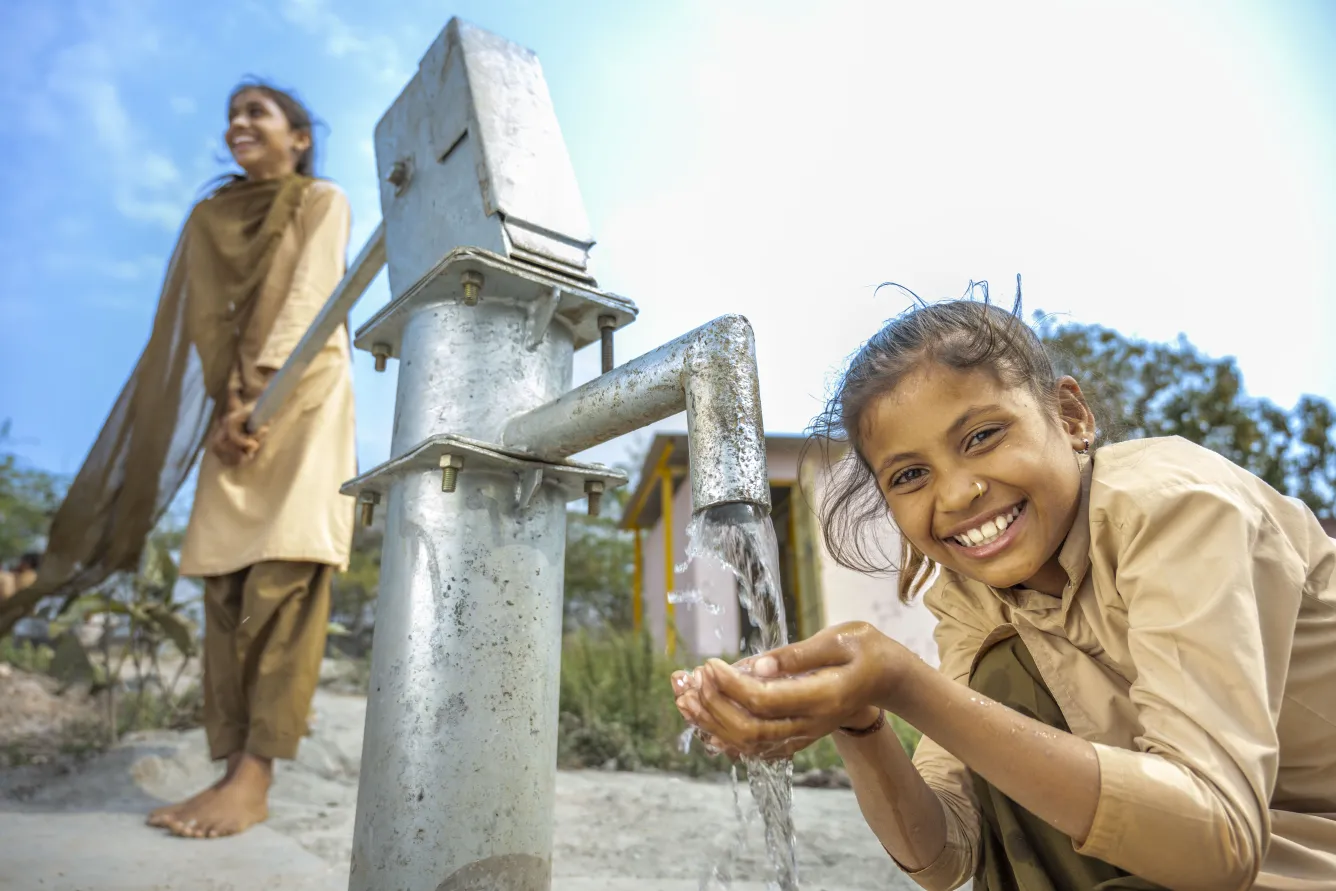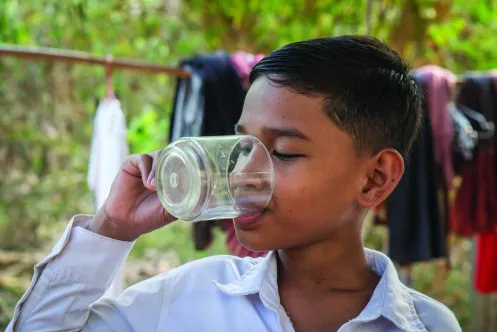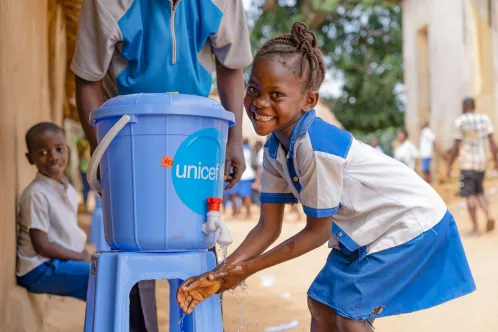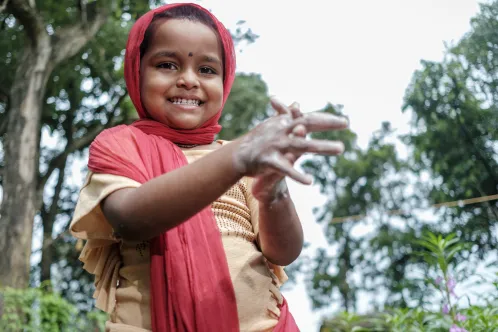ACCESS TO WATER, SANITATION AND HYGIENE SERVICES
Growing up in a clean and safe environment is every child’s right. Safe water, reliable sanitation and good hygiene are vital for their survival. UNICEF provides children with access to water, sanitation and hygiene (WASH) services so they can have a healthier start in life.
WASH IS A CRITICAL AREA OF UNICEF’S WORK
Without access to WASH services, children’s health, nutrition and education are negatively affected.
While some parts of the world have improved access to water, sanitation and hygiene services, millions of children and their families, especially in low-income countries, still can’t get clean and safe water. Climate change is also destroying, drying up and contaminating water sources, leading to greater water scarcity in many regions.
The consequences of unsafe water, inadequate sanitation and poor hygiene are deadly for children. Without basic WASH facilities, children often get life-threatening diseases like diarrhea, cholera and respiratory infections. Over 700 children under age five die every day of diarrheal diseases due to lack of appropriate water, sanitation and hygiene services.
Girls are particularly affected by poor WASH conditions. They are often denied their right to education because of the lack of access to feminine hygiene products, or the fact that many schools don’t have proper, safe sanitation facilities for them to use. As the task of collecting water for their household falls largely to girls, the time they spend on this chore (which often means walking long distances) cuts into their time learning at school.
A GLOBAL WATER CRISIS
IS HAPPENING NOW
HOW UNICEF IS PROVIDING WASH SERVICES TO CHILDREN
UNICEF works in 130 countries to provide children with access to safe water and reliable sanitation, and promote proper hygiene practices.
ACCESS TO SAFE WATER
To ensure children grow up healthy and happy, UNICEF works to help countries move towards water services that are safe, sustainable and affordable. We help identify threats to water quality to lower the risk of water contamination. We also work with our partners to ensure water services in low-income countries are properly maintained.
IMPROVED SANITATION SERVICES
Poor sanitation puts children at risk of deadly childhood diseases, as well as malnutrition that can impact their growth, education and future opportunities. UNICEF is there to help provide essential sanitation facilities and services that children need to fight diseases and grow up healthy.
We’re also working with our partners to change behaviours to end the practice of defecating in the open (such as in fields, bushes, or by bodies of water) which, combined with poor hygiene practices, is a leading cause of child mortality. We are helping countries with high open defecation rates to build low-cost household toilets so that ‘toilet use by all’ becomes the new norm.
PROPEr HYGIENE PRACTICES
Behaviour and social change are at the heart of UNICEF’s work in hygiene. We focus on key behaviours that help children and their families maintain proper hygiene to keep them healthy, such as hand washing with soap, safe disposal of child feces, safe handling and storage of drinking water, and menstrual hygiene.
In 2024 thanks to your support:
- Over 18 million people gained access to basic sanitation services;
- 6.7 million people used climate-resilient water systems (up from 5.4 million in 2022);
- Nearly 9,000 schools and almost 4,000 healthcare facilities were provided with basic water, sanitation and hygiene services;
- Nearly 12 million women and adolescent girls were supported with programs to address menstrual health and hygiene.
WHAT’S THE DIFFERENCE BETWEEN SAFE WATER AND CLEAN WATER?
It’s not enough for water to be clean; it must be safe, attainable, affordable and available for everyone. This means water must be from a reliable source like a well or a water pump, free from contamination, readily available and within reasonable reach.
Learn more about UNICEF’s WASH programs
WATER, SANITATION AND HYGIENE IN SCHOOLS
Children spend a significant portion of their day at school, where a lack of water, sanitation and hygiene services can negatively impact their learning and health. Girls, especially, can struggle to attend and stay in school if they do not have safe, single-sex and hygienic washroom facilities, which are essential for menstrual hygiene management. UNICEF is helping to provide safe water, gender-specific toilets, hand washing facilities and hygiene education in schools to ensure all children have the best learning environment possible.
WATER, SANITATION AND HYGIENE IN EMERGENCIES
To prevent public health emergencies, water, sanitation and hygiene services must be prepared to support children and their communities in times of crisis. As the world’s humanitarian lead on WASH in emergencies, UNICEF provides emergency WASH services in over 60 countries, including those affected by armed conflict, migration crises, natural disasters, and diseases like cholera, Ebola and COVID-19.
Solar-Powered Water Systems
Solar-powered water systems are an innovative safe water solution that helps improve the health, safety and livelihoods of children and their families. They are more reliable than other pumping systems, tap deeper groundwater and are significantly less costly in the long term. Since 2019, UNICEF has helped install more than 6,100 solar-powered water systems in 52 countries.
THE WATER FOR LIFE GALAS
Celebrating 32 years in 2024, UNICEF Canada's annual Water for Life Galas in Calgary and Halifax have collectively raised more than $21.5 million to help children around the world access safe water and sanitation systems.
DID YOU KNOW?
UNICEF water pumps are the most widely used pump around the world. In the 1970s, with the help of the Indian government, UNICEF developed a water pump that was inexpensive and easy to use. It remains a success to this day.




